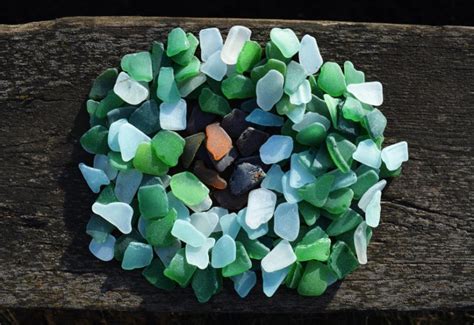Sea glass is a unique form of glass that has been naturally tumbled and polished over time by the waves of the ocean. As a result, it has become a highly desirable material for use in jewelry, artwork, and home decorations. But is collecting sea glass illegal?
The answer is: it depends. It is important to understand that sea glass is not a protected material, nor is it illegal to collect. However, it is important to be aware of the laws and regulations in the specific area you are collecting in and to respect the environment and wildlife. It is also important to follow any restrictions set by private land owners.
Furthermore, certain areas may have restrictions that limit or prohibit the collecting of sea glass. For example, some beaches may be protected by legislation that prohibits the collection of any items from the beach, including sea glass. Additionally, some states may have laws that prohibit the sale or trade of certain items, such as sea glass, in order to protect the environment.
As a result, it is important to be aware of the laws and regulations in the area you are collecting in. It is also important to be aware of the local rules and restrictions in order to ensure that you are not breaking any laws or damaging the environment. Additionally, it is important to be respectful of the wildlife and private land owners in the area.
In conclusion, collecting sea glass is not illegal but it is important to be aware of the laws and regulations in the area and to respect the environment and wildlife. Additionally, it is important to follow any restrictions set by private land owners.
The Legalities Of Collecting Sea Glass
As much fun as collecting sea glass can be, it does bring up a valid question — is it legal?
The legalities of collecting sea glass vary depending on the area you’re in. In the United States, most beaches are public property, so anyone can collect sea glass there. However, many beaches may have laws prohibiting the collection of sea glass, or the collection of anything on the beach. Be sure to check local laws and regulations before collecting sea glass in any area.
In some cases, beaches may be private property. In this case, it is illegal to take anything, including sea glass, from the beach without the permission of the owner. If you do collect sea glass from a private beach, you should always seek permission from the owner first.
In addition, it’s important to note that it is illegal to take any living creatures or artifacts from the beach. This includes sea glass, shells, and other items that may have been left on the beach by previous visitors. Taking these items can damage the environment and is not permitted.
If you are looking to purchase sea glass, there are many places to do so. Many local craft stores, hobby shops, and online retailers carry a variety of sea glass. Prices vary depending on the type and size of the pieces, so be sure to shop around for the best deals.
| Type of Sea Glass | Price Range |
|---|---|
| Chipped Sea Glass | $5-$20 |
| Tumbled Sea Glass | $10-$50 |
| Rare Sea Glass | $20-$100 |
No matter where you choose to purchase or collect sea glass, be sure to follow the laws and abide by the rules. Collecting sea glass can be a fun and rewarding experience, but be sure to respect the environment and the laws of the area.
The Consequences Of Illegally Collecting Sea Glass
Sea glass is a type of glass that has been eroded by the ocean and typically found on beaches around the world. While many people love to collect it, it is important to note that some areas have restrictions against collecting sea glass.
In some coastal areas, collecting sea glass is illegal due to conservation laws. These laws are in place to protect the environment and keep beaches clean. Depending on where the sea glass was collected, it can result in hefty fines or even criminal charges. In some areas, collecting the glass is allowed, however, the individual must obtain permission from the property owner prior to collecting any pieces.
In addition, it is important to note that collecting sea glass may have unintended consequences for the environment. Sea glass is often a by-product of human activity and may be a source of pollution. By collecting the glass, we may disturb the natural ecosystems and habitats of animals that live in and around the beach. For example, sea turtles, fish, and other marine creatures may be disturbed or harmed by the collection of sea glass.
Lastly, it is important to consider the cultural and historical implications of collecting sea glass. In some cases, the glass may be part of a historical site or could contain objects of spiritual or cultural significance. Removing or disturbing these pieces could be considered disrespectful or even theft.
In conclusion, if you are considering collecting sea glass, it is important to research your local laws and restrictions. Additionally, it is important to consider the impact that your activities may have on the environment and respect any cultural and historical significance that pieces may have.
| Advantages | Disadvantages |
|---|---|
| Protects the environment and keeps beaches clean | Unauthorized collection could result in hefty fines or criminal charges |
| No spiritual or cultural significance | Could disturb natural habitats and ecosystems |
| It can be a source of pollution | Possible removal of historical pieces |
 Road Topic Tourism & Travel
Road Topic Tourism & Travel




